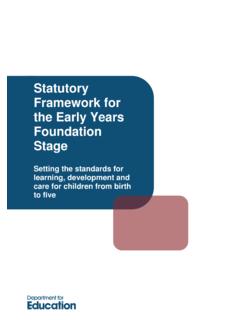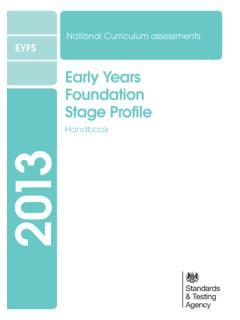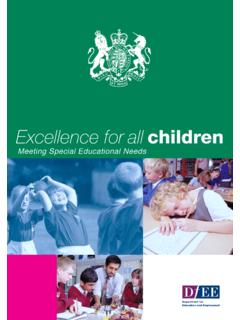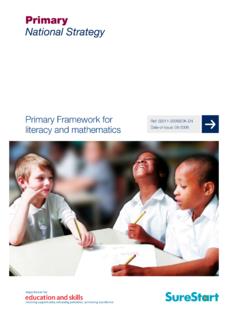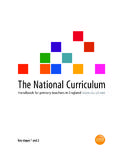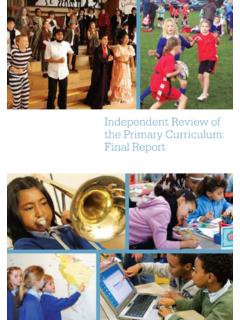Transcription of The Independent R of the Primary C - …
1 The Independent Reviewof the Primary Curriculum12 The Independent Review of the Primary Curriculum: Interim reportExecutive summary 4 Provisional recommendations 8 Introduction 12 ContentsPart OneThe Children s Plan 15A rationale for the curriculum 16 Assessment and testing 19 Other reviews 21 Curricular continuity 22 Aims and values for Primary education 22 Highly reliable curricular content 23 Subjects or what? 26 What is distinctive about children s learning and development in the Primary phase?
2 27 Matching the organisation and content of the curriculum to children s progress through the Primary years 29 Part Two Aspect 1 Curriculum design and content 31 Designing for progression in learning 31 Approaches to the curriculum 33 Areas of learning and subject specifi c teaching 34 How might areas of learning be construed? 36 Skills for learning and life 37 How would areas of learning work? 38 Curriculum aims 39 Importance statement 39 Key ideas 40 Key processes 41 Range and content 41 Curriculum coherence 413 CONTENTSPart Two continued Aspect 2 Literacy.
3 Numeracy and ICT 42 Priorities 42 Aspect 3 Personal development 45 Aspect 4 Arrangements for transitions from the EYFS and through Key Stages 1 to 3 48 Summer-born children 48 Parental concerns 48 What does the research tell us about the best time for summer-born children to start school? 50 Curriculum continuity from EYFS to Primary school: Extending opportunities for play-based and child-initiated learning 51 The importance of play 52 Planning for progression in Year 1 54 Personalised learning 54 The Early Years Foundation Stage Profi le 55 Transferring other information 56 Parents views and contributions to transition 56 Primary to secondary transfer: What are the main concerns?
4 57 Transfer strategies 57 The National Strategies 58 Better individual records 58 Personal tutor and teaching assistants 59 Extended study 59 Aspect 5: Languages 60 Supporting spoken communication and literacy 61 How should languages be introduced in Key Stage 2? 62 What do we want children to achieve? 63 Which language? 63 Transition 64 Developing the workforce 65 Evaluating the introduction of languages at Key Stage 2 66 Next steps 6741.
5 Starting with a rationale for the curriculum, this interim report segments the Secretary of State s remit letter into the following fi ve aspects, each of which will be subjected to further analysis and refi nement for the fi nal report: Curriculum design and content; Reading, writing, numeracy and information communication technology (ICT ); Personal development; Transition and progression, including issues around summer-born children; and Introducing languages at Key Stage rationale for the curriculum2. A rationale for the curriculum, including the aims and values for Primary education, is derived from the Children s Plan, which is taken as the platform for the Review.
6 Because it is dynamic, rather than static, the curriculum should be subject to well-managed, periodic review in response to national and global change. 3. Past reviews have been largely re-active, driven by the need to reduce curriculum overload and over-prescription. This should become a pro-active strategy whereby the frameworks supporting children s learning, including both the statutory curriculum and the Early Years Foundation Stage (EYFS), are reviewed as a whole. This should take place at agreed intervals, rather than as separate phases reviewed out of sequence.
7 So doing would impose a discipline on the process of review, avoid piecemeal change, and afford schools a period of stability in which to achieve agreed curricular goals. Curriculum design and content 4. A design for the curriculum is proposed, which promotes challenging subject teaching alongside equally challenging cross-curricular studies. Given the excellent examples of both of these approaches observed by the Review, high quality subject teaching must not disappear from Primary schools, nor should the benefi ts to children of well-planned cross-curricular studies.
8 To this end, six areas of learning are proposed to give schools optimum fl exibility for planning cross- curricular studies, The Independent Review of the Primary Curriculum: Interim reportExecutive summary1. Key Stage 1 covers ages 5-7, Key Stage 2 covers ages 7-11, Key Stage 3 covers ages ample opportunities to teach essential content discretely and directly. The Review also considers how far the existing division between core and foundation subjects remains valid in a curriculum geared to providing breadth and balance. 5. The six areas of learning dovetail well with the EYFS framework to ease transition from the foundation stage to Key Stage 1.
9 The proposed six areas of learning are: Understanding English, communication and languages; Mathematical understanding; Scientifi c and technological understanding; Human, social and environmental understanding; Understanding physical health and well-being; Understanding the arts and Securing progress which builds on children s prior learning is a central curricular objective. Because progress is goal related, the goals of learning must be explicit in order to guide planning and teaching, whether cross-curricular or focussed on discrete subject content.
10 The existing National Curriculum level descriptors are being reviewed to make sure that they capture valid knowledge, skills and understanding from which to plan for progression. Expert groups are being consulted on the essential content of the curriculum and progression towards understanding the key ideas for the Primary years. These groups include the Royal Society, subject associations and those representing various aspects of personal development. EXECUTIVE SUMMARY6 Reading, writing, numeracy and ICT7. The Review s remit insists that literacy, numeracy and ICT must be prioritised.
